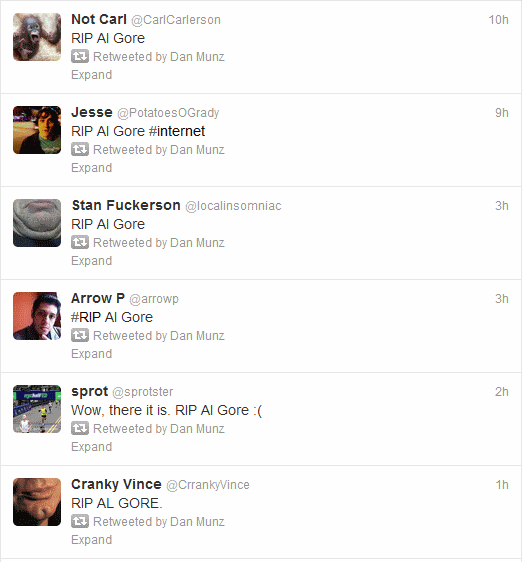Alcohol Can Only Make You More Charming, Not Better Looking
“Research shows that alcohol makes us think we are more attractive than we really are. Even the mere expectation of being tipsy is enough to boost ego. However, the effects are purely in the mind of the drinker. Sadly for them, others do not find them any more appealing.”
London Mayor Hangs Around
“Boris Johnson, Mayor of London, has got stuck dangling in mid-air while riding a zip wire as part of the London 2012 Olympic celebrations…. The Mayor spent around five minutes hanging from the line as spectators took video footage and photographs of his mishap…. The cause of the incident has not yet been officially confirmed, but it is understood to be down to a ‘loss of momentum’.”
Gore Vidal, 1925-2012
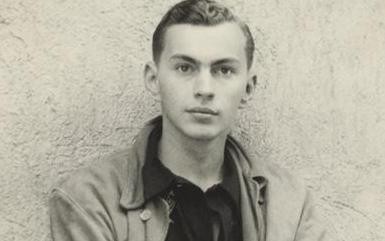
Gore Vidal despised the New York Times through and through and would barely have stomached his obituary in that paper today, as credit-giving and realistic and praising as it is. Charles McGrath notes some of the impetus for this hatred in the obituary itself: the fallout from his 1948 book The City and the Pillar: “Mr. Vidal later claimed that the literary and critical establishment, The New York Times especially, had blacklisted him because of the book, and he may have been right.” Oh, that “may have” would have done him in.
Writing in the New York Times in 1977 — nearly thirty years after The City and the Pillar! — the very liberal Christopher Lehmann-Haupt, the now-retired watchkeeper of the end of an era of literature — reviewed Vidal’s collection of mid-70s essays. He found Vidal’s essays “seductive” (hmm) but found that Vidal had a simple explanation for everything, so what might be the simple explanation for Vidal?
So we are left to speculate over the psychological implications here, and to conclude that Mr. Vidal’s animus toward everything from West Point to the American Establishment — not to speak of academicians, who are, after all, instructors — boils down to an unresolved hostility toward his father, further evidence of which, some would argue, is Mr. Vidal’s cheerfully admitted homosexuality.
Lehmann-Haupt was in part using this as an example of the too-easy explanation — “simplistic, presumptuous and perhaps none of our damn business” — but there it is anyway.
Vidal wrote a letter to the editor which the Times declined to publish. The New York Review of Books published it instead:
This is quintessential New York Times reporting. First, it is ill-written, hence ill-edited. Second, it is inaccurate. Third, it is unintelligent in the vulgar Freudian way. There is no evidence of an “unresolved hostility” toward my father in the pages under review or elsewhere in my work. Quite the contrary. I quote from Two Sisters, a Novel in the form of a Memoir: “my father was the only man I ever entirely liked….” Nowhere in my writing have I “admitted” (“cheerfully” or dolefully) to homosexuality, or to heterosexuality. Even the dullest of mental therapists no longer accepts the proposition that cold-father-plus-clinging-mother-equals-fag-offspring.
These demurs to one side, I am grateful to your employee for so beautifully demonstrating in a single sentence so many of the reasons why The New York Times is a perennially bad newspaper.
Besides, as he discussed in 2007, it was his mother that he hated:
Q. You’ve written about how your parents had a bad marriage — is that where your general opposition to the institution comes from?
A. I think that’s where a lot of it started. When I looked at my mother, who was really one of the few people in my life that I hated, I thought, ‘Dear god, it’s marriage that is the culprit.’
Q. That’s quite something, to hate one’s mother.
A. Well, I adored my father. There he is, in that picture over there. The dark-haired guy. He was the greatest athlete in the history of American universities. Got a silver medal in the Olympic Games in Antwerp in 1920. A wonderful person. We knew each other for 43 years, we agreed on nothing and we never quarreled. Only men can do this. Women can’t.
To be held up, over and over again, over the course of decades, as both being merely troublesome because he is a faggot, from the Times all the way down to William F. Buckley, and to be counted as discreditable solely because he is a faggot, even as he never actually identified as such a thing: what could be more angry-making? Or a point of pride. In 1974:
I am proud to say that I am most disliked because for twenty-six years I have been in open rebellion against the heterosexual dictatorship in the United States. Fortunately, I have lived long enough to see the dictatorship start to collapse. I now hope to live long enough to see a sexual democracy in America. I deserve at least a statue in Dupont Circle — along with Dr. Kinsey.
But his real complaint regarding the Times and the American media had far less to do with that kind of stupidity; instead it had to do with the media’s complicity in the great selling of America’s advertisements for itself. As he said in 2006:
Q: You’re a veteran of World War II, the so-called good war. Would you recommend to a young person a career in the armed forces in the United States?
A: No, but I would suggest Canada or New Zealand as a possible place to go until we are rid of our warmongers. We’ve never had a government like this. The United States has done wicked things in the past to other countries but never on such a scale and never in such an existentialist way. It’s as though we are evil. We strike first. We’ll destroy you. This is an eternal war against terrorism. It’s like a war against dandruff. There’s no such thing as a war against terrorism. It’s idiotic. These are slogans. These are lies. It’s advertising, which is the only art form we ever invented and developed.
But our media has collapsed. They’ve questioned no one. One of the reasons Bush and Cheney are so daring is that they know there’s nobody to stop them. Nobody is going to write a story that says this is not a war, only Congress can declare war. And you can only have a war with another country. You can’t have a war with bad temper or a war against paranoids. Nothing makes any sense, and the people are getting very confused. The people are not stupid, but they are totally misinformed.
And as he wrote in one of his memoirs, published in 2006.
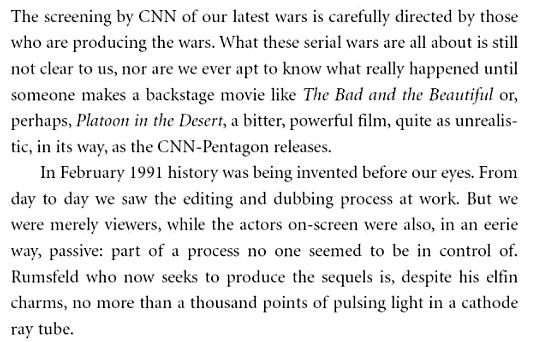
By last year, it could seem like he’d made a kind of peace with all this mess, but viewed another way, he’d actually won on both these fronts. The “heterosexual dictatorship” is in collapse, and the old print media’s particular kind of stenography and passive-”objective” engagement in the news of the day is widely considered suspect. His point of view prevailed. To an interviewer in 2011:
Newspapers have always been lousy in America, but then it could be said that the whole country’s been lousy, so who am I to complain about the general condition? Then again, it’s my job: to complain about the general condition.
Roughing It On An Indie Theater Tour
Roughing It On An Indie Theater Tour
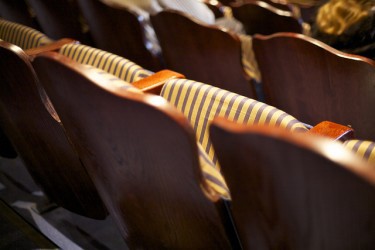
The conclusion of a month-long series on terrible trips, great journeys and getting lost.
It seemed like a good idea at the time. It was 1996, and I was still imagining myself to be some sort of actor. I had acted in a play written by a charismatic young playwright and directed by my best friend and roommate the summer previous, a four-hander, as they say. The playwright, also the star of the piece, decided that he was going to take the show on the road. For three weeks. And, on top of that, one of the roles would be recast with my girlfriend at the time, “Erin.” Was I down with coming along?
Was I? Was I ever. My day job was fully amendable to me disappearing for close to a month, and I had a bit of money saved. What better way to launch a promising career than taking the show on the road, acting for a living? It would be just like being in a rock band, touring the country, but with acting.
And that was exactly how it was, sadly, which reveals how much can change in seventeen years, concerning one’s opinion of the life of a touring rock band.
***
We were a motley caravan: the five of us, me, Erin, my roommate, the playwright and the playwright’s girlfriend, a magazine editor who was rounding out the cast. We were all friends, and we were all interested in acting/directing/playwrighting. We had a box truck, a motorcycle and my car, a 1987 Subaru Justy, which it the model that they rolled out to compete with the Hyundai, a two-door hatchback with a three cylinder engine, seemingly light enough that you could portage it across shallow rivers. The motorcycle was also a set piece, along with a ten-foot canted platform that was taken apart and kept after the last show, which was why we needed the box truck. We drove the first leg in the middle of a freezing March Friday night, driving straight through from Brooklyn to Harrisonburg, Virginia, where the playwright had booked a tune-up show at a coffee shop. We made it before dawn. We were excited.
The reason that we could all afford to do this is because the playwright had arranged lodging for us for the length of the tour. So he said. In Harrisonburg, we stayed at what could most easily be referred to as some sort of commune. It was a nice, clean place up in the hills with maybe ten or fifteen people living together. A bit awkward as we arrived, them just getting up and drinking coffee, showing us to a room with a swept-dirt floor on which we could unroll the sleeping bags and catch a few hours’ sleep. And when we awoke, we were treated to an oddly formal meal. The hospitality was palpable, and we were presented with a vegan meal that, well, tasted like how vegan food tasted in 1996: Gritty. But we weren’t imposing on them, somehow, and we were out of New York, doing a play. And sleep-deprived. It was a little dizzying. I don’t think any of us thought that we were going to land an agent or get booked for a legit show off of this, but we were “working.”
We did the show (like I said, in a coffee shop), which was packed (for a coffee shop). The audience hung around after, wanting to chat and shake hands. Neat. The next morning, the second day out, and we’re already on our way to Louisville, Kentucky, where the rest of our tour would be perpetrated.
***
The theater was a beautiful little place, in which Muhammad Ali had fought or some such back when he was a teen-aged Cassius Clay. It had ninety-nine seats or so and an actual lighting booth. And Louisville was also a beautiful little place, not too big and citied-up, but not without its urban charm. The weather had warmed up and the sky was clear when we drove in. We were very clearly not in New York, not working our shitty jobs, making art out in places were your audiences weren’t peopled only with other people you’d done plays with.
Here’s what it’s like to be in a three-week run of a play in a town you are not from, FWIW. You go through the motions of rehearsing early in the week — everyone knows what they’re doing — and then the days you run, Wednesday through Saturday in this case, you settle down into a routine. What time to show up, how long you can goof off, what time you change into the costume and check props. When to swing by the booth, check out the audience. It becomes rote very quickly.
Of course, the actual being in front of people charges things up. There is adrenaline involved in that, even aside from “acting” (something I think is about the most boring and precious thing to talk about in the world, no offense to the forests of trees that gave up their lives for the discussion of the same). But you hit your marks, say your words and there’s a curtain call before you know it.
Not that there were always many of those people in the audience. Objectively, the play was not a success. And by that I mean only that we did not put so many butts in seats. That was not for lack of trying. The playwright arranged the obligatory local press — the piece in the free weekly, the spot on the local NPR station, appearances at local colleges. I was somehow designated the body man for him at these appearances. Technically I was as much a guest as he was, but it was his show. He had the tendency to get strident in his politics and social theories, and was prone to speaking in all-caps harangues that referenced Marxism (and presumed a cadre-level, fellow-traveling intimacy with Marxism that was maybe ambitious to expect) so it was my job to follow up with, “So come see the show, folks!”
And there was the moment at the college, when a student asked during the (laughable) Q&A;, “What’s it like being a professional actor?” I answered that it was pretty great. This is only uncomfortable in retrospect, as what I should have answered that I was no more a professional actor than I was a professional wrestler, that I was a phony, that I was just fooling around. I was 25.
Much of the trip is a blur (it was a long time ago), and maybe the oddest blank space in the memory is the everyday details. How did we get money? How did we coordinate anything without cellular telephony, or the internet? ATMs? What did we do with all that time? We were only on stage four nights a week, and we didn’t spend so much time rehearsing. That leaves an awful lot of hours that I cannot account for. Maybe that’s just how memory works, but, say, the summer vacations we took when I was a kid, or the summer as an exchange student in Germany, I have a pretty good recall of the mundane.
What I do remember are the vivid parts, the parts when everyone in our group was having fun and seemed generally happy to be around each other. We did habituate a diner, the name of which is gone to me, and we ate many a breakfast there. It was near to a used bookstore and a comic book shop, so we did bum around those. And driving down Bardstown Road, there was a drug store with a decades-old sign on the roof that if read literally said “PRESCRIPTION JONES,” which then became the name of the character of the film noir mash-up play that I never wrote.
Not all of us stuck around Louisville for the entire span. My roommate and the playwright’s girlfriend had to get back to NY for work on off days, so they were basically flying back after a weekend and returning in the middle of the week. So it was the playwright, Erin and me that were left. And the overriding issue was the housing. I actually cannot remember all the places that we stayed. Thing was, when the playwright had said that he had arranged for places to stay, he was exaggerating. He had a few places lined up, and he was certainly not going to let us sleep on the street, but he didn’t necessarily know where we were sleeping tomorrow. There might have been a night or two that we splurged for a hotel. Erin and I did scoot down to Nashville for two days as a break, but we were stuck in a freak snowstorm and didn’t see much of the city. Mostly we were happy to have a bed to sleep in, cheap-ass hotel bed that it was. We crashed at people’s houses. Ultimately, the final week and change we stayed in an apartment that was kept by a regional director of a national chain. We did this without the knowledge of the chain or of the regional director. The playwright was a longtime employee of the place, which was where you worked if you were not working at a bookstore those days, post-college in the 90s. It was a nice pad, but we were in constant fear that we’d be discovered. And, looking back, it was a clear-cut case of any number of crimes, so luck was certainly with us.
It was exhilarating and it was terrible. And no, it wasn’t really a tour. It was a bunch of weeks in Louisville. And towards the end it became exhausting. I didn’t miss Brooklyn or the job I had, but I was tired. It was a liminal existence, and while I had readily signed on for it I became acutely aware of a certain intangibility as the weeks whiled away.
And it was not exactly the highlight of the relationship I had with Erin. We fought. We were in different places. I was chasing some kind of dream. She was chasing some kind of different dream. When we finally left, on a Sunday to drive all the way back in one eighteen hour drive, we alternated arguing with bitter silences. All day long. It was no fun. But we made it back in one piece — or, two, rather.
***
It was not necessarily the Craziest Road Trip! or the Worst Time Ever! But here’s the thing. Before sitting down to conjure this up, I would have trotted the Louisville trip as a go-to Bad Travelling Anecdote at any party. In fact, that’s what led me into re-opening it up here. But in full retrospect, the trip was not bad or even not-fun. There was a certain amount of not-fun involved, of course, but that can be filed under “life”.
I figured out what poisoned my impression of this memory: me. I did that. It was a time of blind optimism and youthful enthusiasm, and whatever ring I was trying to grab at the time I did not grab. It wasn’t the last time on stage, or even the last time on stage on the road, but there’s some part of me that is experiencing unacknowledged regret.
It seemed like a good idea at the time? It was a good idea, and if anything I failed it and not the other way around.
Which brings us back to now: Erin and I are still friends. We broke up a year or two after the trip, but we’ve stayed close, we like each other’s spouses, our dogs are friends. (She says, “Hi.”) And all other participants in the trip are still around, and I’m friendly, if not friends, with all of them. The platform that was the centerpiece of the set? The roommate repurposed that into a loft, which she left with me when she moved out to marry and make a couple of wonderful kids, which I sleep on to this day. And Prescription Jones? There ended up being one: a dog (breed: North Williamsburg Black & Tan) that my roommate adopted and named. Jones (for short) was awesome, and passed away just a few years ago. He was a good dog.
Previously in series: Portraits From A Cross-Country Road Trip, Fly Fishing The Universe, A Chat With A Person Who Has Been To Disney Parks 40 Times, Hiking The Grand Canyon In A Day, The 2006 World Cup With No Game Plan, The Castaway’s Guide To Making A Home and The Slave Who Sailed Around The World
Brent Cox is all over the Internet. Photo by Todd Dailey.
New York City, July 30, 2012
★★★ What came through the windows was glaring and humid. Not bad, not something to hide from, but not worth making a point of going out into. It was something to look at, occasionally, as the hours went by, the browser choked out on accumulating tabs, and the baby painted his way along the wall with a ripe apricot crushed in his fist. The breeze flowed in damply, right on the edge between helpful and unhelpful, take it or leave it. But outside, before sunset, the air was cool, truly cool, and the breeze was bracing. Had it been this way all day? Was it a mistake to have missed so much of it? A sun-wearied child set things straight: No, and no.
I Can't Face Being Subscribed to WND's Horrifying Emails Any More

I can’t do this anymore. I was staying subscribed to World Net Daily’s email blasts because I figured it was important to know what the wingnut right thinks about our COMMUNIST IN CHIEF and about olive oil. (???) But it’s just like opening your gmail every day and having Nicolas Cage as Ghostrider emerge and spit in your mouth. It’s not like that even. It IS that. A hideous digital face. Spitting. In my open mouth. I thought this was my job! But no job is worth this! Can someone take over monitoring them for me? Like I think this is the Southern Poverty Law Center’s job or something.
Funk Terrifies White Woman
“A few minutes before my reading, store employee Marshall popped in my CD. Not 30 seconds into my go-go playlist, a white woman went to the cashier to complain. The song in question wasn’t even a go-go song. It was Parliament’s 1970s funk classic ‘Chocolate City’ — a song that took on a moniker that was being used by Washingtonians celebrating the city’s first elected mayor, a black man named Walter Washington: ‘What’s happening, C.C. They still call in the White House, but that’s a temporary condition….’ The blonde woman marched straight to the cashier, who referred her to the owner of Politics & Prose. She said the music was ‘racist’ and demanded they stop playing it. I am so very sad to report that the store actually complied.”
— Natalie Hopkinson, author of the book, Go-Go Live: The Musical Life and Death of a Chocolate City, writes about an unfortunate incident that happened last week at a Washington D.C. bookstore. (via)
3 Tired TV Tropes & 3 Shows That Toppled Them
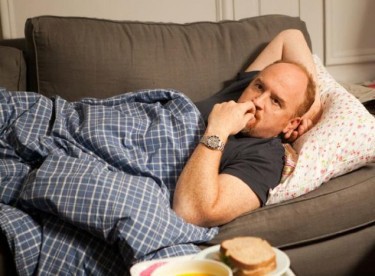
This #NoBollocks content was produced in partnership with Newcastle Brown Ale. If you enjoy this article, won’t you be a love and watch a TV commercial on the Internet? Go on, it’s right there on the right.
After two or three decades of exposure, watching TV can feel a little bit like going home to visit your family. At first it’s comforting to see so many old familiar faces. But… why don’t these people ever change? Why are they so rigid and repetitive and tedious? And what makes them think they’re remotely interesting, or even marginally entertaining?
On the internets, we refer to these humans as either “stereotypes” or “the detritus of the past,” depending on the situation. Having witnessed these stock characters over and over again as children, TV showrunners grow up and populate their own TV shows with them. This way, they hardly even have to wake up to write that scene where the Sensible Mom With The Hot Body confronts the Rebellious Teenager about her skimpy outfit. Although writers like to call this “being in the zone,” it’s actually more like simple regurgitation. You know how mother birds eat worms, then vomit them into their babies’ mouths? It’s like that, only it pays a lot more.
That said, in the past decade, lots of smart, talented writers who might’ve become novelists during another era have decided that getting paid obscene amounts of money is much nicer than typing away in insolvent obscurity while slowly drinking themselves to death. As a result, some of these recurrent familiar faces on our TV screens are getting a much-needed makeover. Let’s meet a few of them, shall we?
THE HAPLESS DAD
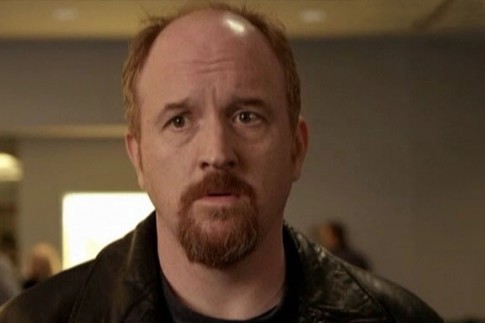
On the vast majority of family shows, “Dad” isn’t a person so much as a shapeless halfwit, fumbling confusedly with modern appliances, sputtering hopelessly in the face of tiny marital challenges, and just generally underwhelming friends, family and foes at home and at work. Strangely, though, this subhuman of limited charms, very little wisdom, and almost no capacity for grasping complex emotions is, nine times out of ten, remarkably smug about himself and his abilities. Name almost any TV dad on any TV show in TV history, and they’re all pretty much the same with minor variations. They’re simple, self-satisfied beasts who’ll go to great lengths to avoid hassles. As accurate a snapshot of the domesticated male as this might be, there are only so many jokes you can squeeze out of a human being with the charisma of an overstuffed armchair.
Yes, it’s true that, as Hanna Rosin recently pointed out at Slate, the Hapless Dad has evolved to a state where he occasionally enjoys parenting (No way!) and isn’t always terrible at it (Amazing!). Even so, many of the standard complacent-jerk dimensions are still in place, even on great sitcoms like “Modern Family” and “Up All Night.” Even The Evolved Hapless Dad makes clueless remarks, screws up with clock-like precision, and feels proud of himself in spite of it all.
But, given how inept he is, why doesn’t Hapless Dad hate himself more? Why isn’t he anxious or depressed or paralyzed by low self-esteem, doomed to spend the balance of his days making time with those buxom Nord beauties from Skyrim? And how long would the Sensible Mom With The Hot Body reasonably stick around before her friends urged her to dump that self-satisfied schmuck on the couch?
Thankfully, Louis CK came along and endowed the Hapless Dad with the self-loathing that he rightfully deserves. On FX’s “Louie,” our hero embodies all of the fumbling and emotionally stunted behaviors of the standard idiot dad, but with generous servings of spite, dread and learned helplessness ladled on top. Instead of chuckling and shrugging and waving off his wife’s nagging, Louie long ago alienated his wife, who pops up as his ex now and then, mostly to marvel at how lazy and disgusting and useless he continues to be. Louie doesn’t blame her, because he himself is in a perpetual state of despair and horror at his own vileness and ineptitude.
Now, some of you might say that “Dexter” and “Breaking Bad” and “Californication” reinvent the Hapless Dad by making him a serial murderer/drug kingpin/womanizer. After all, aren’t those guys just Hapless Dads who’ve channeled their pent-up rage and neuroticism into cooking up drugs and screwing teenagers and slicing people up with expensive knives?
You make a good point. But personally, instead of watching unhinged dads blow people’s faces off, I’d prefer to watch Louie panic as the ice cream on his pie starts to melt because his girlfriend told him not to eat it until she’s done talking about whether or not they should break up. It’s much more suspenseful.
THE FRIEND
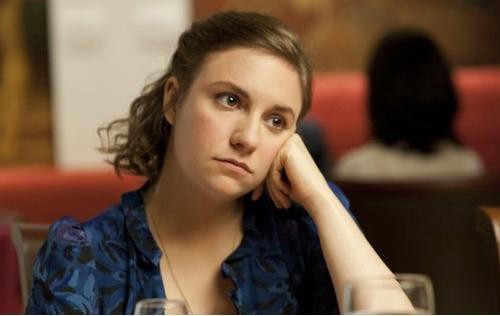
The only way to describe The Friend is by saying that she isn’t The Hot One, she’s The Other One. This makes her incredibly insecure. Most of the time, she’s actually pretty hot. Who cares, really? All that matters is that someone else has been named The Hot One, so she can’t be it. This is the moral of her story: You Are Not It.
Think Natalie, laughing her terrible snorty laugh, while Blair flips her hair at some date rapist in a letterman’s jacket on “The Facts of Life.” Think Miranda, ordering Chinese take-out for the millionth time, while Samantha sleeps with an entire Italian soccer team on “Sex and the City.” The Friend second-guesses herself, sabotages her only hopes of love, and pours herself into her (pathetic, dead-end, soul-sucking) career, all because she’s all tangled up inside over with the fact that she hasn’t been deemed the most supernaturally attractive woman in the world. When the kid with the giant forehead tries to kiss Jennie Garth on “90210,” what do you think she’s thinking? She’s thinking about Shannen Dougherty. Shannen Dougherty, who everyone agrees is way hotter than Jennie Garth. Why? Because she has crooked eyes and she’s dangerous, that’s why. Everyone agrees.
The Friend is never dangerous, and couldn’t for a second get away with having crooked eyes. They wouldn’t even let her onto the set with crooked eyes. They’d say, “You take your mismatched crooked-ass eye sockets and you get off the set immediately.”
Until now, that is. HBO’s “Girls” has been proclaimed many things — the most groundbreaking show in modern televisual history, the most racist, elitist, lily-white show among an endless sea of racist, elitist, lily-white shows, the best thing you or your roommate have ever seen, the most repetitive gaggle of Brooklyn stereotypes ever to air on premium cable (and that’s saying a lot). But while we’re making grand proclamations, the one thing that Lena Dunham has most definitely done for all of womankind is to emancipate them, forever and ever, from being The Friend.
Because on “Girls,” not only is The Friend (Hannah, played by Dunham) not all that insecure (relatively speaking), but she also has more swagger and courage and heart than The Hot One (Marnie) and The Other Hot One (Jessa) and The Sort of Hot One (Shoshanna) put together. Instead of whining and weeping snottily into her hands the way The Friend would do on any other television show, Hannah gets naked and refuses to exercise but realizes that she is exactly 13 pounds overweight (this isn’t some fantasyland, after all, except for the trust funds and bad Fu Manchus). Hannah has lots of not-very-great sex. She’s sometimes timid and confused, sure, but she’s brave enough to state her feelings to people directly. She’s self-possessed. But most importantly, she is not preoccupied with not being The Hot One. She wears clothing that doesn’t compliment her body. She doesn’t appear to brush her hair regularly. She doesn’t have to, because she doesn’t believe that there is some center of the universe located somewhere other than where she is, and she’ll only get there if her hair is brushed. No. She can simply exist and do what regular people do: Eat, worry, sleep late, roll her eyes, fall on her face.
No, it shouldn’t be cutting-edge for The Friend to be treated like a normal human being. But it is anyway.
THE WISE OLD PROFESSIONAL
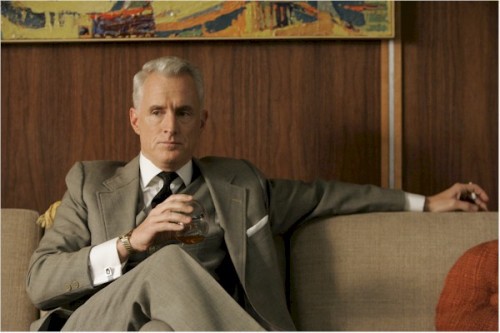
White-haired dudes in suits with the answers to the mysteries of the universe are as old as the universe itself. Just think of John Houseman in “The Paper Chase,” intimidating an auditorium full of young lawyers in training with his immense knowledge of everything under the sun. On TV, when some slick professional with white hair walks into a room, you expect him to start talking like Lorne Greene, telling you who’s doing things right and who’s doing things wrong and where you fall into the mix. You expect him to be a real leader of men.
Then there’s Roger Sterling of “Mad Men.” With his senior partner status and his silvery hair and his soothing luxury-car-commercial voice, Roger Sterling should by all rights be the kind of Wise Old Professional who could take Don Draper under his wing (tips) and show him the ropes. But “Mad Men” isn’t a story about a man who seeks and wins his fortune in advertising and lives happily ever after. Instead, “Mad Men” is a story about how the blind pursuit of the American dream (and its shallowest, most fleeting spoils) will erode your soul, year after year, until you’re a sad little shadow of your former self.
By transforming The Wise Old Professional into The Ambivalent Aging Slacker Starving For Wisdom, Roger Sterling not only foreshadows what lies in store for Draper (divorcing his wife to marry a much-younger secretary, for one), but also offers an eerie reminder of what a life of pampering and indulgences will eventually do to your psyche. Like a gorgeous false advertisement, Sterling is the smoothest character in the entire office, but nothing is good enough for him. He drifts from one distraction to the next, bored out of his skull, unable to derive any lasting meaning out of any of his experiences, or to locate any real purpose in any of his relationships.
By twisting The Wise Old Professional into a sort of wizened, embittered jester, showrunner Matthew Weiner is telegraphing exactly where the capitalist game leads: to a perpetual state of narcissistic befuddlement. And Sterling makes that state look bewildering, chilling, and vaguely sexy. Bravo!
Even though the television is still as filthy with tired characters as your mother’s livingroom is filthy with insufferable blood relatives, a few brave souls are venturing forth unfettered by the one-dimensional dysfunctions of yesteryear. Now if you could only convince your sister to stop kicking you in the shins under the dinner table.
A contributor to the New York Times Magazine, Heather Havrilesky was Salon.com’s TV critic for seven years and cocreated Suck.com’s Filler before that. She’s the author of the memoir Disaster Preparedness. She has dispensed misguided advice at the rabbit blog since 2001.

